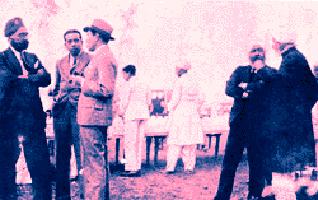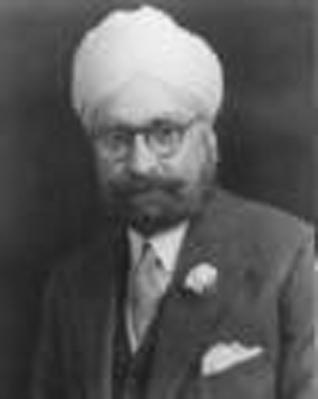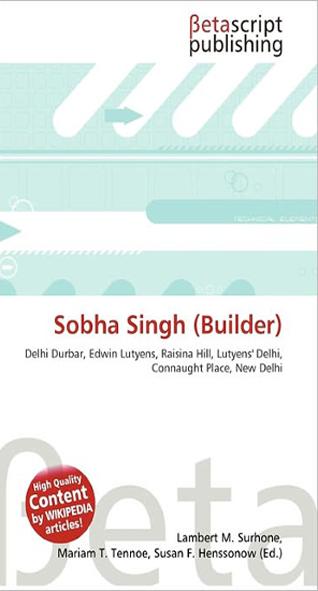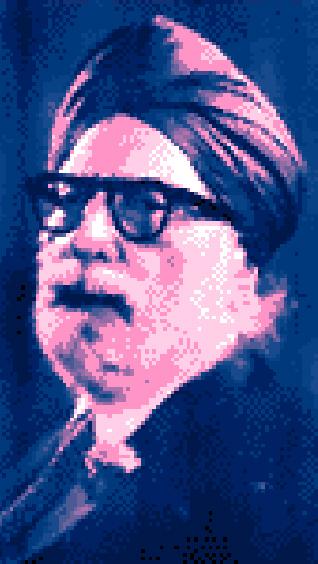
Above: Sardar Sobha Singh (far left) talks to the architect, F.B. Blomfield. On the right, Sardar Teja Singh Malik and Sardar Narain Singh.



The Man Who Laid The Foundation Stone of New Delhi ... And Then Built It!
by AAYUSH SONI
Among the Maharajas and the English nobility who graced the Delhi Darbar of 1911, were two Sikh gentlemen.
One of them - a 22-year-old contractor – had been busy working on the Kalka-Simla Railroad, but was awed by King George’s announcement that the imperial capital would shift from Calcutta to Delhi.
Sobha Singh’s first job was to relocate the foundation stones from where the King and Queen had laid them, in Kingsway. Under cover of darkness (so it would not be taken as a bad omen), he moved them to the new site on Raisina Hill. Here, in the light of a petromax lamp, he personally laid the real foundation of New Delhi.
It was a fitting start.
Sobha Singh became the original great builder of New Delhi, constructing at least 28 of its iconic structures, including South Block, India Gate, the Jaipur Column outside Rashtrapati Bhawan, Vijay Chowk, the National Museum and the Modern School on Barakhamba Road.
Like Edwin Lutyens and Herbert Baker, the principal architects whose plans he helped materialise, Sobha Singh was never honoured by having a road or building named after him - and isn’t popularly remembered today. Yet he acquired so much land in the new city Delhi that he was famously called aadhi nayee dilli da maalik (owner of half of New Delhi).
Sobha Singh recently resurfaced in Delhi’s memory with the release of Celebrating Delhi, a compilation of eight lectures given in the 2006 Sir Sobha Singh Memorial series (and three newer articles). The speakers at the lecture series were quintessential Delhi figures, including historians Narayani Gupta, Upinder Singh, William Dalrymple and Sohail Hashmi, environmentalist Pradip Krishen and publisher Ravi Dayal.
The keynote speaker was writer Khushwant Singh, the son of the builder himself.
“Rarely was a man so identified with the birth of a city as Sir Sobha Singh was with New Delhi,” he wrote in the introduction, “translating into sandstone and marble most of the imperial blueprints of Lutyens and Baker.”
Many of the essays in Celebrating Delhi unfold in this period. Khushwant Singh’s lecture, drawn largely from his own memories, revisits New Delhi when it was more brick kilns than buildings and “contracts were going a-begging”. It was the first generation of New Delhi builders getting super-rich, both legitimately (buying empty land) and otherwise (using surplus materials to build themselves large houses, Khushwant Singh recalls).
Other chapters layer detail onto the city that Sobha Singh built, such as how it was named (Narayani Gupta points out that the nationalist upsurge in the ’20s led to names linking British rule to forgone rulers: Prithviraj Road, Asoka Road, Aurangzeb Road) and how it was greened (Pradip Krishen: “No native species [were] planted on any of its avenues … Not a single species of tree that can be called a Delhi native.”)
Today, lecture series apart, the most prominent public remembrance of Sobha Singh is a nameplate at his former residence on Janpath, now the headquarters of the Sir Sobha Singh Memorial Trust.
“Not only him, but even the contributions of Lutyens and Baker have never been duly acknowledged,” said Mala Singh Dayal, editor of Celebrating Delhi and grand-daughter of the builder. “Politicians are only out to please some kind of vote bank.”
According to Gurbaksh Singh, son of the builder and president of the Memorial Trust, the family - Delhi’s intellectual first family - once requested the NDMC to name a road after Sobha Singh, but “general laziness” crept in and the family didn’t chase the request.
It wasn’t just twenty-first century forgetfulness that served to efface Sobha Singh from New Delhi. In the years after Independence, figures who had been friendly with the Raj landed in the bad books of the interim government. “Liaquat Ali Khan [then finance minister] started an income tax enquiry commission against people who supposedly made money during the [World] War and hadn’t paid taxes,” said Gurbaksh Singh. “My father had to spend three years answering to that commission.”
However, there was another side to this workaholic builder - that of a family man who was more liberal, and more humble, than most of the patriarchs of his generation. “A lot of his grandchildren, including me, married outside the Sikh community and he was completely okay with it,” said Mala Singh Dayal. Sobha Singh named nothing after himself or his children. After his father, he named Sujan Singh Park, the set of spacious private apartments in the heart of the city where his descendents now reside.
Still, that’s not a bad way to be remembered.
Conversation about this article
1: Baldev Singh (Bradford, United Kingdom), December 13, 2011, 3:51 PM.
A Sardar is Prime Minister in Delhi and the most respected politician on Earth! If Sikhs built Delhi, then a Sikh has 'modernized' a decrepit nation still at odds with civilized values.
2: Sangat Singh (Kuala Lumpur, Malaysia), December 13, 2011, 6:07 PM.
Khushwant Singh's Delhi- a rather irreverent magnum opus narrates the saga of Delhi, and his nostalgic, eventful trip from his village Hadali to Delhi. I must find my copy of 'Delhi' and re-read it as a tribute to Sir Sobha Singh. I saw him once. It was in Chandigarh and I was visiting his daughter and son-in-law, who had arranged Prof. Darshan Singh's kirtan and asked him to sing the Kirtan Sohila shabad which I recorded. Even that I must retrieve from my heap of collections of tapes from the 60's onward.
3: Harry Singh (Delhi, India), December 14, 2011, 1:53 AM.
Wow, being a Sikh and having stayed in Delhi for donkey's years, I never knew about this 'Father of Delhi'. That's because no one's really talked about him much. I guess it's time we let people know about men like Sobha Singh and make them realize what we as a community have done for this nation.
4: Ari Singh (Sofia, Bulgaria), December 14, 2011, 3:27 AM.
I really enjoyed reading this article. I often met Khushwant Singh ji when he was editor of the Illustrated Weekly of India in the seventies. I wanted him to write about Joginder Singh Bacchu, world ace rally driver and Guinness record holder from Kenya. He asked me to collect photos from Joginder, who happened to be a close friend of mine, which I did. Then Khushwant said: "Write it yourself and bring me the article". My initial shock, as I had never written any article before, was soon overcome by his stern reaction and encouragement: "Yes, you can do it!" The article was published under my pen name, Dooly Singh. Even being close to him, I never knew his father had built New Delhi until now from sikhchic.com. We need more of this to enlighten our community, otherwise we will have many forgotten heroes!
5: Gurpal Singh Bhuller (Chester, Virginia, U.S.A.), December 14, 2011, 11:50 AM.
The house where he lived has the best address in New Delhi - it is 1-A Janpath. It was the site of many kirtans and bhog ceremonies when Sir Sobha Singh was still alive. If I recall correctly, it was the Hungarian Embassy for some time. Wonder who the current occupant is?
6: Jaswant Singh Sachdev (Phoenix, Arizona, U.S.A.), December 16, 2011, 9:25 PM.
Just beautiful. One way to celebrate such a distinguished man would be to ask the present Prime Minister, Manmohan Singh, to undo such an ignorance among all of us through establishing a memorial to S. Sobha Singh's achievements. But then, such kind of initiative requires guts, which unfortunately might not be the Indian Government's cup of tea.


